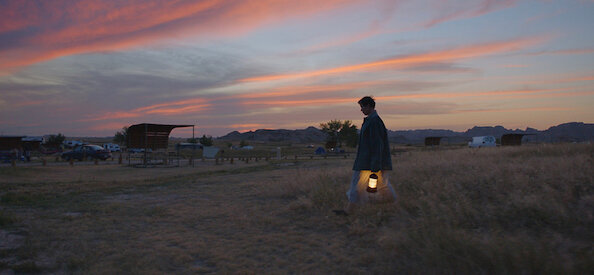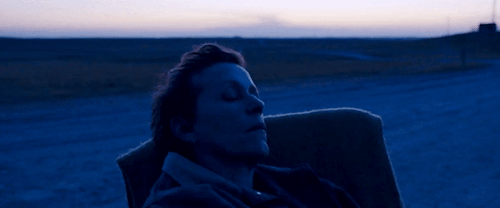Nomadland: Home Is Where You Make It
With her third feature, Chloé Zhao explores the American West in her quiet roaming epic, Nomadland. Based on the 2017 non-fiction book Nomadland: Surviving America in the Twenty-First Century by Jessica Bruder, the film delivers a poetic character study that is reinforced by a phenomenal performance from Frances McDormand.
After losing everything in the Great Recession, a woman embarks on a journey through the American West, living as a van-dwelling modern-day nomad.
Following the breakout success of 2018’s The Rider, writer/director Chloé Zhao (who also served as producer and editor on the project) returns with her most sprawling and expansive work to date. With Nomadland, Zhao pierces the mainstream and continues to put her poetic fingerprints all over outsider culture Americana without sacrificing any of her strengths as a storyteller. The soft, unassuming, and wonderfully meandering film chronicles one woman’s nomadic journey across the American West in all its natural splendor, complication, and heartbreak. Full of compassion, emotion, and visual poetry, the film literally takes viewers on a roaming journey that features stunning magic-hour shots and rapturous vistas, beautifully rendered by cinematographer Joshua James Richards, who has worked with Zhao on all three of her features.
The film opens with some tragic statistics about US Gypsum, who shut down their sheetrock plant in Empire, Nevada after 88 years due to reduced demand. This shutdown completely wiped out the small company town of Empire a short 6 months later, rendering it a ghost town and leaving its inhabitants jobless and without homes. The film’s central figure, Fern (played magnificently by Frances McDormand), is one of these folks who’s been run out of her home and familiar way of life. Cast out by her crumbled community and still grappling with the loss of her husband, she sets out in her van (appropriately named Vanguard) with a few personal effects toward a seasonal gig over at an Amazon factory.
It’s there that she meets Linda May, who serves as a guide and role model for Fern’s newly adopted lifestyle, and it’s there that the film lays down its central thesis. In an early scene where the seasonal workers are introducing themselves to one another, one employee shows off some Morrissey lyrics she has tattooed on her body, one of which is: “Home, is it just a word, or is it something that you carry within you?” This sentiment ripples through the film and all its open spaces, and it’s essentially the question Fern is trying to answer for herself throughout her rove. As much as the nomadic lifestyle is solitary and isolated, Fern finds community (and “home”) in her fellow nomads, most of whom she meets at the Rubber Tramp Rendezvous, an actual annual meetup for vandwellers held by Bob Welles (who plays himself in the film) in Quartzsite, Arizona. The RTR sets her up with the tools she needs to be self-sufficient (mostly), and it lines up the peripheral figures that punctuate Fern’s narrative trajectory.
Zhao and James Richards do wonders with McDormand’s face (similar to how Paul Schrader used Ethan Hawke in First Reformed), using her lived-in life and wrinkled face to make Fern feel even more real. McDormand dials in an incredible performance, and she disappears into the role. Both her and David Strathairn (who provides excellent support) blend in naturally with the film’s many non-actors and real-life nomads, who heighten the film’s realism and deserve just as much praise. The film has many moments of dialogue that are effective and genuine, but it’s in its quiet, understated moments (like the film’s beautiful tracking shots) that it shines the brightest. This puts a lot of emphasis on McDormand and her incredible abilities as a performer, but Zhao’s editing also plays a strong hand in the effectiveness of these moments as well. She’s able to successfully create the illusion of time passing by through the presentation of these small snippets and brief scenes that appear in the many montages that breakup Fern’s story. These tidbits — some of which (like the achingly lonely New Year’s Eve celebrations) will downright break your heart — can feel minute and inconsequential at first blush, but they play an integral part in the film’s tapestry and culminate in surprising ways.
At its core, Nomadland is a film about loss, letting go, and above all, community. Zhao’s tender compassion and lyrical poetry give audiences a touching and heartfelt look into this fascinating American subculture, taking them for a ride that softly lingers well after the credits roll. Essentially a neo-western that trades in equine for vans, this slow-burning, modest character study is overflowing with sincerity, and it will quietly capture your heart.
Recommendation: If you’re a fan of Frances McDormand, Zhao’s previous work, or tales about outsider culture, definitely check out Nomadland. It’s a phenomenal piece of work and continued proof of Zhao’s stunning filmmaking abilities.
Rating: 5 Vanguards outta 5.
What do you think? We want to know. Share your thoughts and feelings in the comments section below, and as always, remember to viddy well!



